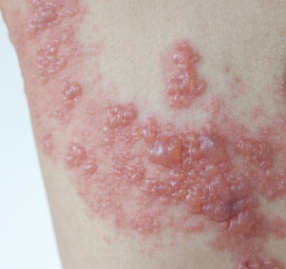
Pregnancy is a unique time in a woman’s life when the body goes through a variety of changes. While some of these are normal and designed to prepare the body for birth, it’s important to understand unnatural developments that may seem like typical pregnancy pains but instead mask a more serious condition, like shingles. Developing shingles during pregnancy can pose additional complications and intense discomfort and pain for the mother that should be monitored closely.
If you’ve had chickenpox, the varicella-zoster virus that causes shingles is already in your system, lying dormant. Although the body’s immune system usually suppresses the varicella-zoster virus, anything that affects the immune system or changes the body, like pregnancy, has the ability to impact the virus being kept at bay.
Dangers of Varicella-Zoster and a Shingles Pregnancy
It’s important to note that there is a difference between shingles and chickenpox in terms of the potential harm to mother and child during pregnancy and immediately after birth. Though shingles and chickenpox are caused by the same virus, contracting chickenpox during pregnancy bears a higher risk for long-term severe harm to a fetus and newborn. Chickenpox early in pregnancy can lead to issues for newborns like low birthrate, and it can also result in birth defects. The most urgent threat from chickenpox during pregnancy, for babies, is when the mother contracts chickenpox within the week before birth or just after—within a few days of—giving birth. Contracting chickenpox during this time can cause serious infections that can be life-threatening for a newborn.
In terms of shingles and chickenpox, while shingles are also caused by varicella-zoster, it is less common in pregnant women. Most experts agree the risk is notably less than with chickenpox, and one study even shows no evidence of fetal harm for women who develop shingles during pregnancy. However, despite the general consensus that mother and child will not suffer long-term impacts from shingles during pregnancy, one cannot ignore the intense symptoms that shingles can cause.
The symptoms of shingles virus can cause immense discomfort during pregnancy and result in undue stress. Characterized by intense pain, shingles typically manifests externally as a bright red rash with blisters that are filled with fluid that crust over upon breaking. The shingles rash typically develops as a stripe or patch that envelops one side of the torso, but can also develop on the neck or face.
It’s worth noting that, while people affected by shingles experience the intense symptoms of the virus such as pain, they may never develop the outward signs of the virus, like an external rash. Other signs and symptoms of shingles can include itching, headache, sensitivity to light, fatigue, fever, and sensitivity to touch. This can make shingles harder to identify during pregnancy, as it can be interpreted as other maladies. We recommend seeking immediate medical attention if you experience any of the symptoms associated with shingles to attain a proper diagnosis and to avoid any of the complications that can come from shingles.

Prevalence and Incidence of Shingles
There are approximately one million cases of shingles reported in the United States per year, and due to the natural changes that occur in the body during pregnancy, women who are pregnant are at a higher risk of developing the infection. If you’re pregnant and not immune to chickenpox and the varicella-zoster virus, have a discussion with your doctor to determine the steps to keep you and your unborn child safe.
The varicella-zoster virus is highly contagious and can spread to anyone not immune to chickenpox through direct contact with open shingles sores. Once infected, the recipient will develop chickenpox, not shingles. If you are pregnant and have not had the chickenpox, avoid exposure to anyone who you know to have the infection.
While a shingles pregnancy for women is very unlikely, it is possible. Contact your physician immediately if you develop any rash during pregnancy. If you are planning a family and worried about the possibility of shingles, talk to your doctor about your risk. If you are already pregnant, practice healthy habits like eating well and exercising regularly, and let your doctor know if any symptoms arise.
Early diagnosis of a shingles pregnancy can minimize the potential for complications that can result from shingles for you and your baby. Additionally, if you’re not sure whether or not you have had chickenpox, your doctor can perform a blood test to identify any antibodies to varicella-zoster that may indicate whether or not you can develop the infection.
